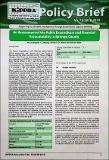| dc.description.abstract | The Public Expenditure and Financial Accountability
(PEFA) assessment was carried out in the County of
Baringo and five other counties, namely: Nakuru, Kajiado,
Makueni, West Pokot and Kakamega. The exercise, which
was undertaken by KIPPRA in conjunction with the World
Bank (Kenya Office) in 2017, was the first sub-national
PEFA assessment in Kenya following the devolved system
of government. The rationale for the PEFA assessment
is to provide a clear and deeper understanding about
the functioning of the public finance management
(PFM) system and the organizational aspects of existing
institutions at county level. The main objectives of the
assessment include: i) assess the state of financial
management capacity in the county government; ii)
identify gaps in terms of capacity, systems, policies and
processes in PFM; iii) provide a basis for PFM reforms; and
iv) facilitate and develop a self-assessment capacity at the
county level. The users of PEFA include the private sector,
civil society organizations, faith-based organizations and
international development institutions. The PEFA scores
and reports allow all users of the information to gain a
quick overview on the strengths and weaknesses of the
county's PFM systems. The importance of PEFA is to
facilitate in the attainment of fiscal discipline, strategic
resource allocation, and efficient service delivery. The assessment covered a period of three (3) fiscal years,
2013/14, 2014/15 and 2015/16. It focused on seven (7)
key pillars of the PEFA framework, namely: (i) budget
reliability; (ii) comprehensiveness and transparency; (iii)
management of assets and liabilities; (iv) policy-based
fiscal strategy and budgeting; (v) predictability and control
in budget execution; (vi) accounting and reporting; and
(vii) external scrutiny and audit. | en |

